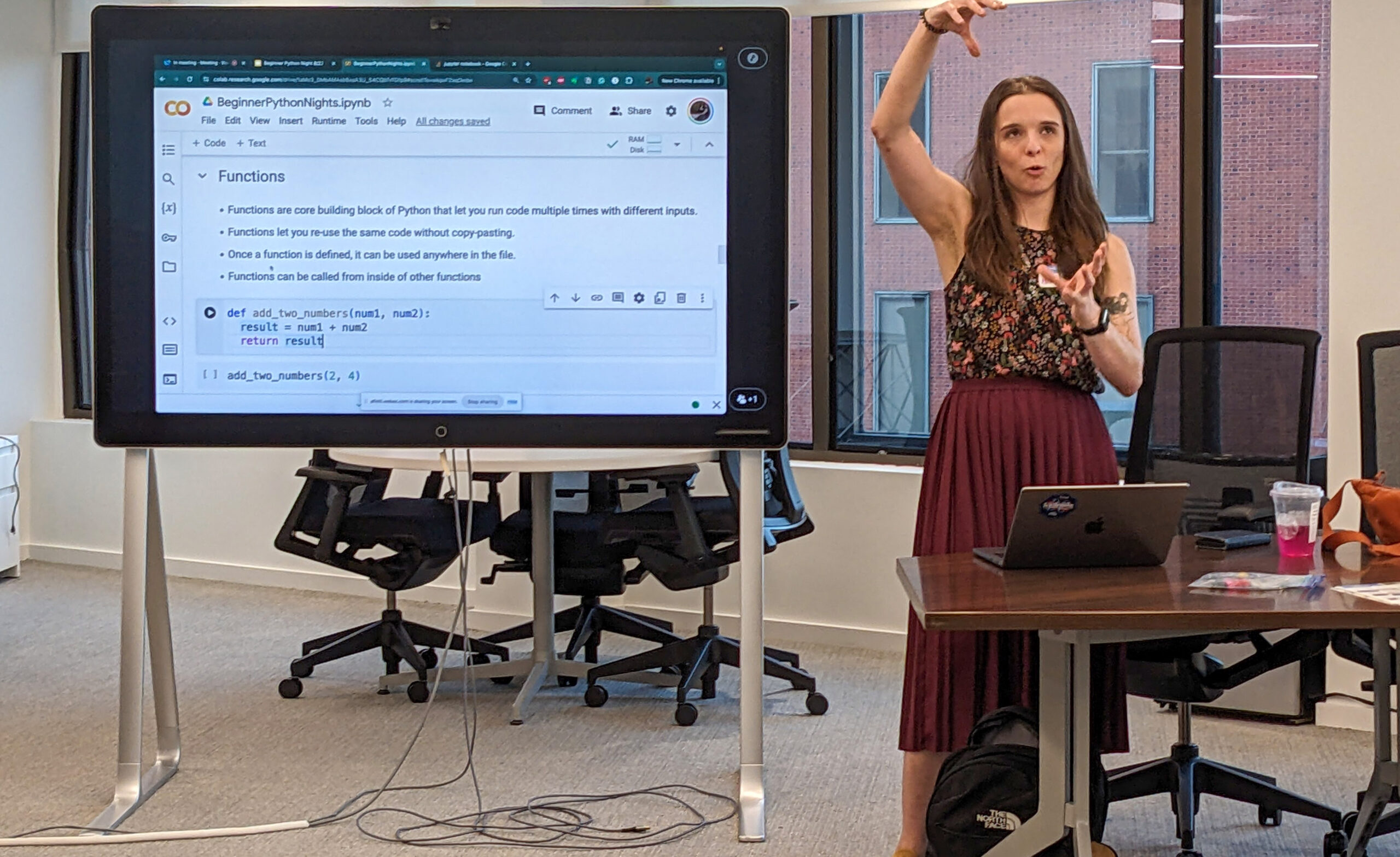Back when Mary Gibbs decided to change her career track from neuroscience to data science, the nonprofit Women Who Code was instrumental in helping her make the shift. So when the organization abruptly closed for good this spring, she felt the need to act.
To help fill the void, Gibbs joined with other technologists in the region to launch a new group. Called Women and Gender eXpansive Coders, it’s been meeting regularly, and continues to grow.
“I wouldn’t have made it to where I am without the help of other people in this field,” Gibbs told Technica.ly. “I feel this compulsory feeling of, I need to help the community that gave me so much … to keep pushing and helping people where I can.”
Headquartered in Atlanta and founded in 2011, Women Who Code offered workshops and different events for people working in tech in 145 countries across the world, according to its website. It shut down in April citing funding concerns, a move that left a wake of disappointment and as technologists like Gibbs lamented the loss of a valuable resource.
Now a senior applied scientist at Relativity living in Herndon, Gibbs started out going to Women Who Code Python workshops, and by 2021 was volunteering regularly. In 2023, she became a volunteer director of programming for the DMV chapter.
“We want to create a space for people to feel comfortable, to be able to learn.”
Mary Gibbs, Women & Gender eXpansive Coders
A week after Women Who Code shuttered, Gibbs connected with other volunteer directors to establish something new to fill the void. She and fellow organizers Naty Clementi and Camille Clayton sent out a poll in the still-active Slack channel to determine what the new name should be — Women and Gender eXpansive Coders won. It also has an acronym: WGXC.
“We wanted people in the community to feel part of the new organization,” said Gibbs. “Giving power in terms of the naming is a way that we could all come together and forward.”
The new meetup group, not yet a nonprofit, hosts events focused on women and nonbinary technologists at least once a week, including coding workshops, interview crash courses and virtual meets. Gibbs and the other coleaders are working on building relationships with local companies, finding more spaces to host events and finding more members to be a part of the group.
‘You could sense that the organization might be in trouble’
In this post-“cheap money” era, where higher interest rates have dampened startup growth and made fundraising more difficult, several other nonprofit organizations in the tech and entrepreneurship space have recently closed their doors.
Nashville-headquartered Girls in Tech, which aimed to empower female technologists through mentorship and bootcamps, shut down in July. Byte Back, which provided digital literacy classes in the DMV and Baltimore, abruptly closed that same month. And the nonprofit Venture for America, which placed college graduates with startups across the country, shuttered in August.
The Women Who Code shutdown was unexpected, per Gibbs.
The nonprofit had a negative net income of nearly $200,000 per its most recent available tax forms (2022), but its balance sheet was strong with about $2.3 million in savings and investments. And it was actively fundraising. During Women’s History Month this March — about a month before the organization would close its doors — Women Who Code staff were pushing a donation campaign, according to Gibbs, and calling for volunteers to do things like put up promotional banners on LinkedIn profiles.
In early April, however, when Gibbs joined a national call with other volunteer directors and Women Who Code staff, she said she knew something was off, even though org leaders did not go into specifics.
“You could kind of sense that the organization might be in trouble,” she said. “But then we didn’t hear much after that.”
In mid-April, Gibbs received an email that the nonprofit was “taking a break,” she said, and would leave only a handful of staff to “respond to urgent needs.” About a week later, just minutes before the public announcement, she received an email it was set to completely shut down.
Some panic ensued after the announcement, per Gibbs, who said local leaders were given no information about next steps.
“There were a bunch of directors in the global channel, asking a bunch of questions, and there was just no one there really to respond,” Gibbs said.
They weren’t sure what would happen to the local chapters, or if the Slack channels and different presentations created by the parent organization would disappear. Eventually, it was communicated that documents would be saved, but it would need to be rebranded. The Slack was also preserved, and remains active under the new WGXC name.

A more inclusive name and an independent future
Gibbs and her WGXC coleaders have lots of plans going forward, she said
They’re hoping to incorporate Women and Gender eXpansive Coders as a nonprofit organization, which will help it raise money to put on events and provide more resources to more people. They don’t want to join a parent org, because they don’t want something like what went down this spring to happen all over again.
The local group doesn’t yet have any formal partnerships, but Gibbs has started to work with software company Excella to host events in that space, and is talking with DC Startup Women to find where the two groups might align.
Under Women Who Code, the local group was always inclusive of technologists beyond women, but Gibbs noted she’s glad that attitude is clear in the group’s title.
“People always thought we were just women only,” Gibbs said. “But we’re so much more than that. We want to create a space for people to feel comfortable, to be able to learn.”







